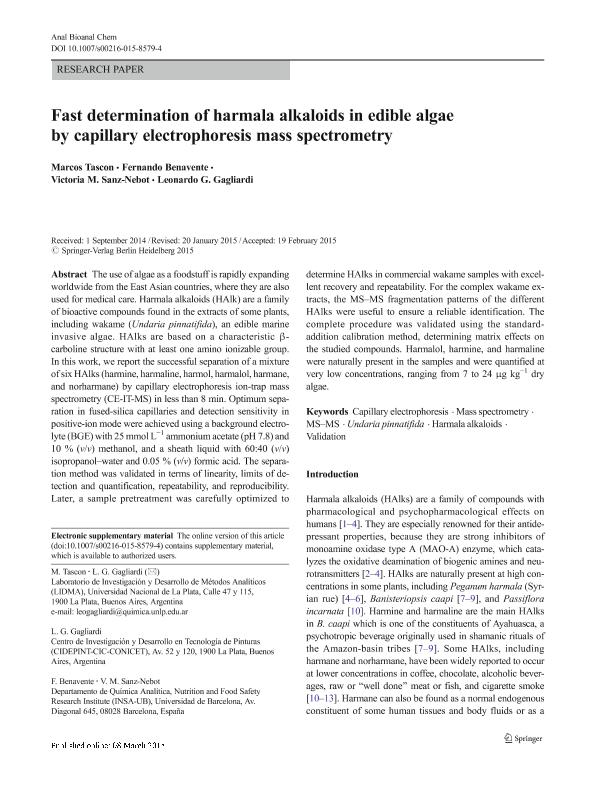Artículo
Fast determination of harmala alkaloids in edible algae by capillary electrophoresis mass spectrometry
Fecha de publicación:
05/2015
Editorial:
Springer Heidelberg
Revista:
Analytical And Bioanalytical Chemistry
ISSN:
1618-2642
e-ISSN:
1618-2650
Idioma:
Inglés
Tipo de recurso:
Artículo publicado
Clasificación temática:
Resumen
The use of algae as a foodstuff is rapidly expanding worldwide from the East Asian countries, where they are also used for medical care. Harmala alkaloids (HAlk) are a family of bioactive compounds found in the extracts of some plants, including wakame (Undaria pinnatifida), an edible marine invasive algae. HAlks are based on a characteristic β-carboline structure with at least one amino ionizable group. In this work, we report the successful separation of a mixture of six HAlks (harmine, harmaline, harmol, harmalol, harmane, and norharmane) by capillary electrophoresis ion-trap mass spectrometry (CE-IT-MS) in less than 8 min. Optimum separation in fused-silica capillaries and detection sensitivity in positive-ion mode were achieved using a background electrolyte (BGE) with 25 mmol L−1 ammonium acetate (pH 7.8) and 10 % (v/v) methanol, and a sheath liquid with 60:40 (v/v) isopropanol–water and 0.05 % (v/v) formic acid. The separation method was validated in terms of linearity, limits of detection and quantification, repeatability, and reproducibility. Later, a sample pretreatment was carefully optimized to determine HAlks in commercial wakame samples with excellent recovery and repeatability. For the complex wakame extracts, the MS–MS fragmentation patterns of the different HAlks were useful to ensure a reliable identification. The complete procedure was validated using the standard-addition calibration method, determining matrix effects on the studied compounds. Harmalol, harmine, and harmaline were naturally present in the samples and were quantified at very low concentrations, ranging from 7 to 24 μg kg−1 dry algae.
Palabras clave:
Capillary Electrophoresis
,
Ms-Ms
,
Undaria Pinnatifida
,
Harmala Alkaloids
Archivos asociados
Licencia
Identificadores
Colecciones
Articulos(CCT - LA PLATA)
Articulos de CTRO.CIENTIFICO TECNOL.CONICET - LA PLATA
Articulos de CTRO.CIENTIFICO TECNOL.CONICET - LA PLATA
Citación
Tascon, Marcos; Benavente, Fernando; Sanz Nebot, Victoria M.; Gagliardi, Leonardo Gabriel; Fast determination of harmala alkaloids in edible algae by capillary electrophoresis mass spectrometry; Springer Heidelberg; Analytical And Bioanalytical Chemistry; 407; 13; 5-2015; 3637-3645
Compartir
Altmétricas




